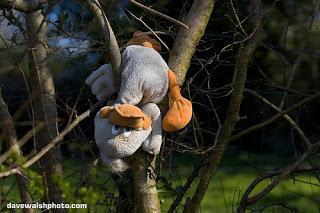by Eugene Field
The little toy dog is covered with dust,
But sturdy and stanch he stands;
And the little toy soldier is red with rust,
And his musket moulds in his hands.
Time was when the little toy dog was new,
And the soldier was passing fair;
And that was the time when our Little Boy Blue
Kissed them and put them there.
"Now, don't you go till I come," he said,
"And don't you make any noise!"
So, toddling off to his trundle-bed,
He dreamt of the pretty toys;
And, as he was dreaming, an angel song
Awakened our Little Boy Blue---
Oh! the years are many, the years are long,
But the little toy friends are true!
Ay, faithful to Little Boy Blue they stand,
Each in the same old place---
Awaiting the touch of a little hand,
The smile of a little face;
And they wonder, as waiting the long years through
In the dust of that little chair,
What has become of our Little Boy Blue,
Since he kissed them and put them there.
In a twist of the Mother Goose nursery rhyme's central character, Eugene Field uses childhood imagery in Little Boy Blue to create a poem which is designed to break hearts. The original little boy from the nursery rhyme is sleeping under a haycock. The reader doesn't know what has happened to Field's little boy but the implication is that he has died as the last thing he did was kiss his toys before he went to bed.
The image of an abandoned toy is a simple and much-used metaphor for lost innocence. Think of a natural disaster and the camera operator's inevitable focus on a doll in the rubble or a soft animal floating in a flood. Having little property of their own, children cling to their toys, imbuing them with personalities and life. Therefore, to see a toy abandoned carries implications of an accident for surely a child wouldn't willingly part with their toys? Any parent who has tried to throw old toys out knows the near impossibility of the task.
I'm going to come out and say it. I think this poem would have been a cliche when it was first published in 1888. Perhaps a popular cliche given the rates of infant mortality a century ago and the fascination with death which came in the wake of Emily Dickinson and Edgar Allen Poe. It smacks of the sort of cheap shot sympathy plug that pads out Danielle Steel plots. It is, to put it another way, popularist.
Is that what we want to do with our poetry? A simple, cliched image that is instantly understood? The toys in Field's poem, a dog and a soldier, seem unimaginative and I don't like the repetition of little toy, little hand, little face, little boy, little chair. OK, we get it - this is about a very small person and you'd like us to be living in a world of 'aww' and sobs.
Field wrote his poetry primarily for children. The fact that he would write a poem that forces them to imagine being dead and leaving their toys behind doesn't annoy me as much as the patronising nature of the piece. It smacks of the sort of dull, simplistic poetry that fills collections of children's poetry and convinces many that the medium is tedious and filled with niceties. Ugh.
On a final note, Field's poem Wynkin, Blynken, Nod (1889) is, in my opinion, a highly derivative and inferior version of Lear's Owl and Pussycat (1871). There, I said it. It feels good to climb down from the fence.

